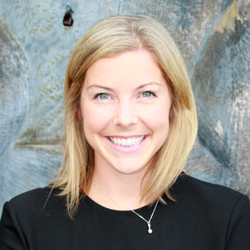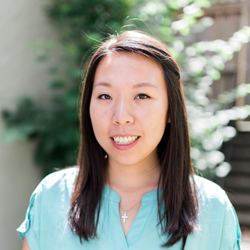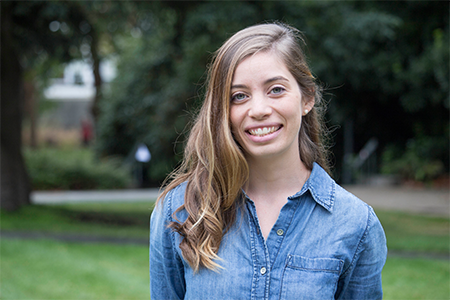
Kelsey Kerr, part of the largest cohort of first-year students to join UBC’s speech-language pathology program.
Nearly five years ago, Kelsey Kerr’s journey to becoming a speech-language pathologist was ignited — but it wasn’t through an exchange of words, but rather an exchange of pictures.
“Because she couldn’t speak, we needed to rely on alternative ways to communicate,” recalls Kerr, who started working with young adults with disabilities after completing her undergraduate degree at UBC in 2011.
“We started using pictures — she would hand me an image of a cookie to indicate she wanted one,” says Kerr. “For me, the exchange was powerful — it started off small, but I began to witness her gain a little more independence each day.”
Recognizing her passion for helping others and giving ‘voice’ to those who have difficulty communicating, Kerr began exploring the prospect of going back to school to become a speech-language pathologist.
This fall, after two years of completing a series of prerequisites, Kerr moves one step closer to her career goal, as one of 36 first-year students — the largest cohort in history — to join UBC’s speech-language pathology program, part of the Faculty of Medicine’s School of Audiology and Speech Sciences.
Over the course of the next few years, Kerr and her fellow classmates will not only build a strong foundation in communication and swallowing disorders through graduate coursework, but also gain hands-on experience working alongside practitioners during clinical externships in a variety of community settings across the province.
Since 2014, thanks to a $2.5 million boost in funding from the government of B.C., the number of first-year seats for a Master of Science in Speech-Language Pathology has grown from 23 to 36 slots — a 56 per cent increase.
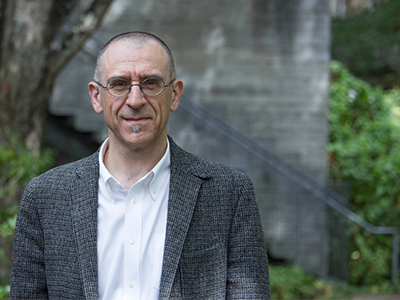
Valter Ciocca, Director of UBC’s School of Audiology and Speech Sciences.
According Valter Ciocca, who has served as the Director of the School of Audiology and Speech Sciences for close to a decade, the expansion of the speech-language pathology program — the only one in B.C. and one of only two in western Canada — represents a significant development for the thousands of British Columbians with speech and language difficulties and disorders.
“Whether it’s diagnosing language delays in children or helping to treat swallowing disorders acquired as a result of a brain injury, speech-language pathologists play a critical role in serving the healthcare needs of British Columbians,” says Dr. Ciocca.
“There is a real need for more professionals who are trained to diagnose and treat communication and swallowing disorders. The growth of UBC’s speech-language pathology program will go a long way in helping to increase the number of speech-language pathologists who are registered and licensed to practice right here in B.C.,” he adds.
But the recent investment in the program is not just about meeting the pressing demand for qualified speech-language pathologists in B.C.
Over time, it’s hoped that the expansion of the program will help alleviate and ultimately bring about a more permanent solution to the shortage of speech-language therapists in underserviced areas of B.C.
“We know that there is a large unmet demand for speech-language pathology services, especially in remote, rural and northern communities,” says Dr. Ciocca.
For Kerr, originally form Port Moody, B.C., the prospect of practising in a smaller community after graduating is attractive.
“Growing up outside of Vancouver, I enjoy living and working in a tight-knit community, and I think that working in a smaller community will allow me to be exposed to a wide variety of opportunities, and take on a broad scope of practice,” says Kerr.
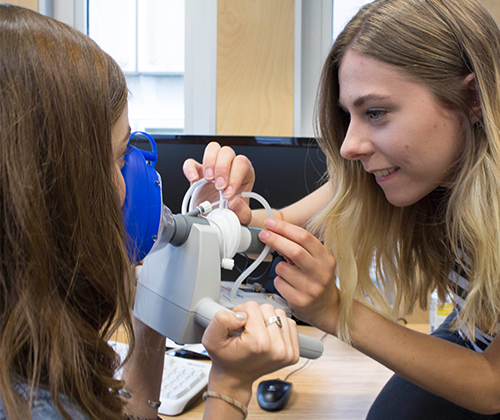
Gillian O’Toole, a second-year speech-language pathology student, showcases equipment used to test pulmonary function at UBC’s School of Audiology and Speech Sciences.
Among the students who entered UBC’s speech-language pathology program from 2010 to 2014 — 90 per cent of graduates now in practice have chosen to stay in B.C. Many have gone on to work for B.C.’s health authorities or school systems, while others have pursued private practice or employment with non-governmental organizations.
Some graduates, like Nathan Hoffart, have chosen to pursue a combination of experience in the private and public sectors. After completing the program in 2013, Hoffart — the current President of the BC Association of Speech and Language Pathologists and Audiologists — moved to Terrace, B.C., where he now works as a speech-language pathologist for a local school district, while running a small private practice on the side.
While the School was already home to state-of-the-art teaching and research labs, as a result of the government’s investment, the School has been able to enhance its learning spaces and bring on new faculty — like Stacey Skoretz — to continue enriching the learning experience for students.
For speech-language pathology student Gillian O’Toole — now entering her second year in the program — the blend of classroom and hands-on experience has been a highlight of UBC’s program. This past summer, she completed externships on Vancouver Island, working with the Nanaimo School District as well as at a private practice in Duncan — placements, which she says, were highly tailored to complement her past experiences and interests.
The School’s involvement in community outreach, through initiatives like the Aphasia Mentoring Program and the Advancing Language and Literacy (ALL) Group, has also been a rewarding experience for students like O’Toole.
“The students in this program have the opportunity to get involved with the community, both to help and to learn,” says O’Toole.
Like Kerr, O’Toole is excited about embarking on a career that offers such a broad scope of practice — from assessing and addressing receptive and expressive language needs, to working with individuals with feeding, swallowing, and voice disorders.
“The greatest contribution of a speech-language pathologist is to a client or patient’s quality of life,” says O’Toole. “Working to maximize the quality of life for clients can help individuals achieve greater independence, help them create better relationships, and become more involved in their communities.”
Meet more UBC speech-language pathology students
Jessica Barclay
What attracted you to the field of speech-language pathology?
Recognizing the importance of communication on life participation, I decided that I wanted to know the how and why behind various communication disorders. I also wanted to be able to offer support to those who experience difficulties in this area in order to help improve the overall quality of their lives.
Joyce Tull
What attracted you to the field of speech-language pathology?
Being able to help others in a medically related field has always been a passion of mine, and communication is such a key factor to how people interact with each other on a day-to-day basis.
